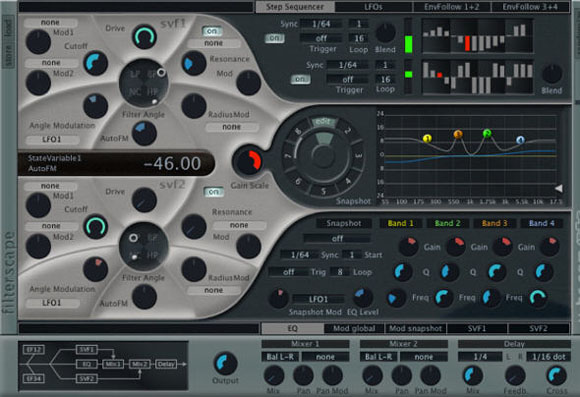Updated: The plugin pictured here, as in the Apple story, is Urs Heckmann’s Filterscape. I ommitted a reference to his site. Urs has done some truly incredible things with AU and in plugin design in general; sorry I missed that. See comments for some heated discussion from developers on AU, from a number of angles. -PK

Apple is crowing about its growing “Audio Unit community” on its developer site:
The Sound of Opportunity: The Audio Units Community Takes Off [Apple Developer Connection]
Now, to be honest, I’ve never seen anything that special about Audio Units. AU adds another format to the pile without adding any major new features, and it’s Mac-only; the whole point seems to be Apple giving themselves a platform “exclusive.” As an end user, I think fxpansion‘s wrapper is a must-have for packages like Logic, and I’m even happier that Ableton Live supports VST and AU seamlessly on the Mac (and DirectX/VST on the PC).
But developers I’ve talked to are, for the most part, perfectly happy porting plugins to the Mac and to AU. (Cakewalk, the Windows-centric developer that just brought their Dimension instrument over, says, basically — a piece of cake. Or pie.)
I’ll also say, for the novice developer, Apple has a lot of goodies available for free. Want to develop for Digidesign? Prepare to jump through a LOT of hoops. Want to develop an AU plugin? Everything you need is available as a free installation from the disc that came with your Mac or OS X upgrade.
If that’s not enough, Apple has reduced the whole development process to five easy steps in the article above. Some steps are easier than others. Step one: “start with an idea.” Great! Step two: “Write the DSP algorithms . . . the Core Audio SDK . . . is a collection of C++ classes. By subclassing from these classes to build your plug-in, you can be assured that the your engineering foundations are solid.” Okay, a bit trickier.
Sure, the easy way is to develop a plugin in a tool like Reaktor or Max/MSP, but if you’re learning to program, this could actually be fun. Let us know how it goes, okay? (And developers — want to chime in on your take on the “AU community”?)